It was January 1985 and Chichester lay under a thick coat of snow. The Cathedral grounds sparkled in the winter light, the hush of the snow matching the stillness inside. David Riley, recently arrived from Manchester Cathedral where he had held the same role, stepped through the cloisters for the first time in his new post at Chichester.
Forty years on, David is still singing, still anchoring the sound of Chichester’s choral tradition. To mark this incredible milestone, he sat down with Ellen Cheshire from the Chichester Cathedral Trust. The Trust is currently spearheading our Match Funding for Music campaign, a key part of the effort to raise £5 million by 2026 to safeguard the future of music at Chichester Cathedral for generations to come.
I knew this was where I was meant to be.
David
Ellen: David, 40 years! Do you remember your first day?
David: Oh, vividly. It was January 1985 - absolutely freezing. Snow everywhere and the Cathedral had this hushed magic. But I felt totally at home. I knew this was where I was meant to be. I’d been interviewed the previous autumn by Alan Thurlow, who was Organist and Master of the Choristers at the time - we ended up working closely together right up until his retirement in 2008.
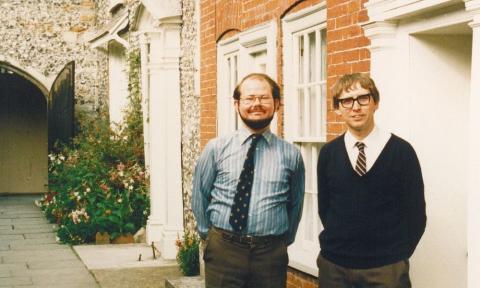
Ellen: And you’ve barely stopped singing here since.
David: Pretty much! I had five years up at York Minster from ’86 to ’91 - Yorkshire was home for me, so it felt like a return. But Chichester called me back. It’s very much my musical home now.
Ellen: Let’s start with the basics. What is a Lay Vicar?
David: We’re professional singers, not clergy. We don’t preach, or lead services - we support worship through music. That’s our job and it’s a full-time musical commitment. Our job is entirely musical - we sing!
Ellen: And Lay Vicars are paid, trained musicians?
David: Absolutely. We sing a minimum of eight services a week, plus weddings, funerals, special services, concerts, tours and BBC radio broadcasts. It’s not a hobby - it’s a livelihood. And that’s why the Cathedral’s music fundraising matters so much.
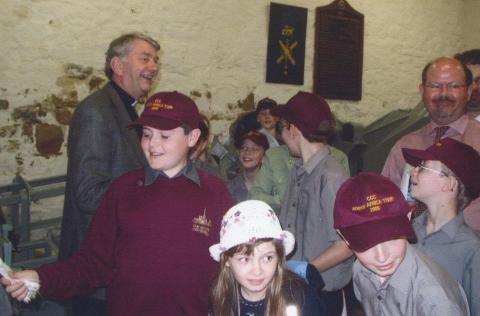
Ellen: Is being a Lay Vicar a full-time job?
David: Not quite. It’s a part-time post - quite typical in cathedral music. Most of us combine it with other work - I teach piano and singing. Others work in offices or freelance. But we’re all fully committed to rehearsals and services. It’s a real team effort.
Ellen: Tell me more about being part of a team of adult singers?
David: There are six of us: two altos, two tenors and two basses. That’s been the standard since the time of Henry VIII. We sing opposite each other in the choir stalls, so you get to know your counterpart very well. Mine is Richard Patterson - he also manages music and liturgy at the Cathedral.
Ellen: You sing bass - what does that add to the harmony?
David: The bass is the foundation - the anchor. Without it, the music can float off. A good bass part gives everything shape and weight.
You’re part of something bigger than yourself
David
Ellen: Let’s go right back. When did you first fall in love with choral singing?
David: I was seven. While most of the country was celebrating England’s World Cup win in 1966, I was getting ready to join the choir at St Jude’s Church in Halifax. That’s when it clicked - that sense of belonging, of being part of something bigger. And I loved the sound. Still do.
Ellen: So, it’s safe to say singing has always been your thing?
David: I grew up in Yorkshire, but I was born in Nairobi in 1959. There was always music at home - I was humming along to the radio before I could talk properly. Yellow Submarine was a favourite!
The real turning point came in ’66, when I joined the choir at St Jude’s. I stayed there until 1979, when I moved to London to study at the London College of Music. After graduating in ’82, I joined the choir at Manchester Cathedral, where I stayed for two years - and then came here.
A life in harmony
Ellen: You’ve sung for some amazing people over the years.
David: I’ve been really lucky. In 1991, I sang for Pope John Paul II in Rome with the Wenhaston Choir. In 2005, the Chichester Cathedral Choir went on a two week tour of South Africa, singing for Archbishop Desmond Tutu in his office in Cape Town was unforgettable. It may not have had the acoustics of a cathedral, but the intimacy was moving. You could see how much it meant to him.
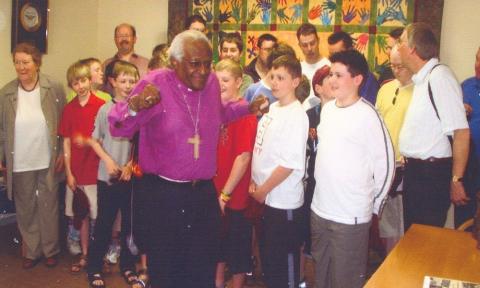
Ellen: And royalty?
David: I’ve sung in the presence of the Queen three times, but the most memorable by far was the Royal Maundy service here in Chichester in 1986. The whole city felt electric. I remember the pageantry - the Beefeaters in full regalia, the packed crowds lining the streets, the hushed sense of occasion inside the Cathedral. And then there was the Queen herself, dressed in navy, so composed and gracious. To sing at such a historic and intimate service, in your own Cathedral, in front of your monarch - it was unforgettable. In 2008, the then Prince of Wales - now King Charles - visited Chichester for the 750th anniversary of St Richard’s death. We presented him with a Russian icon of the saint. It was a beautiful moment - respectful, quiet and full of significance.
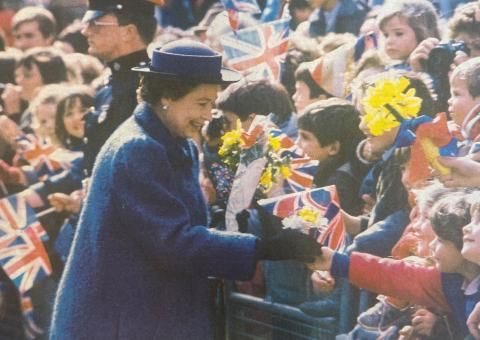
Ellen: And you sang in Berlin before the Wall came down?
David: We did! In 1986, the Cathedral Choir toured Germany and we crossed Checkpoint Charlie to sing in East Berlin. We were accompanied by a military officer.
The difference between East and West was stark, but people welcomed us so warmly. It reminded me how universal music is - even in divided times.
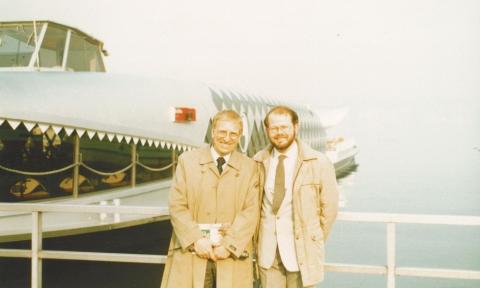
There’s beauty in the quietness
David
Ellen: What do you love most about the work?
David: The rhythm of the Church year. The seasons flow - Advent, Christmas, Lent, Easter. My favourite is Epiphany. It’s quieter, post-Christmas and the Cathedral has this stillness. The music is rich and subtle - some of my favourite pieces are in that season. I always say to people: come to Evensong in January. It’s cold and dark, yes, but there’s a beauty in that quietness.
Ellen: I think a lot of people still aren’t sure they’re “allowed” to come to Evensong. What would you say to them?
David: Oh, absolutely come. You don’t need to be religious or even know what’s going on. Just come, sit and let the music do its thing. It’s free, it’s calming and it’s really quite special.
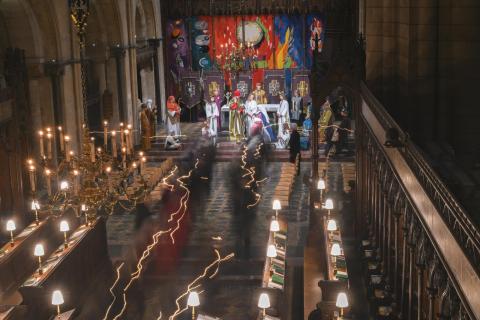
Looking ahead
Ellen: What changes have stood out in your 40 years?
David: The introduction of girl choristers has been a fantastic success. Under Charles Harrison’s leadership, it’s brought a new energy to the choir. I’m proud to have witnessed that change. At the moment, there are still more boys than girls, but it would be great to see greater parity in the future.
Ellen: Anything special coming up?
David: This October, we’ll be conducted by Sir John Rutter - alongside Charles - at a special fundraising concert. And we’ve just returned from this year’s Southern Cathedrals Festival in Salisbury. Next year, it returns to Chichester. It’s always a highlight - the choirs of Chichester, Winchester, and Salisbury singing together. The sound can be very exciting.
Ellen: What are your hopes for the future of cathedral music?
David: I’d love to see more young people involved. Cathedral choirs offer exceptional training, lasting friendships and a real sense of purpose. That’s why the fundraising work you’re doing matters so much. It’s not just about keeping the lights on - it’s about securing posts, funding scholarships and creating opportunities through new commissions, recordings and tours. It’s about helping young musicians thrive in a professional and inspiring environment.
As long as I can contribute, I’ll be here!
David
Ellen: What do you do when you’re not singing?
David: Travel! Though often it’s a busman’s holiday - I love visiting cathedrals. I’ve seen almost all of them in the UK - just two remote Scottish ones left. Globally, my top three are St Peter’s in Rome, Florence Cathedral and Chartres in France. I’ve sung in Chartres - it’s one of our twin cities.
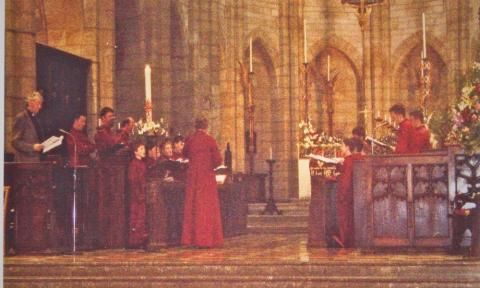
Ellen: What keeps you singing?
David: Simple - I still love it. Every phrase, every psalm, every moment when the choir locks into harmony. As long as I can contribute, I’ll be here.
Ellen: Thanks, David - it’s been great hearing your stories and seeing your genuine passion for your role as Lay Vicar here at Chichester Cathedral.
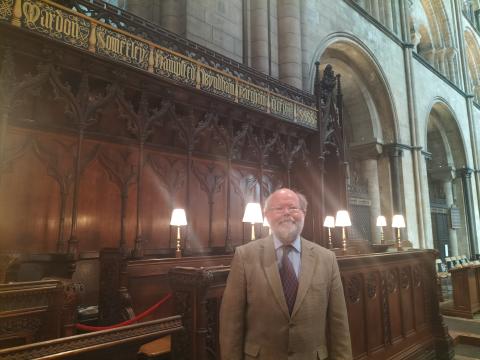
Help secure the future of the music here at Chichester Cathedral
Chichester Cathedral Trust is raising £5 million by 2026 to protect and sustain the Cathedral’s centuries-old musical tradition - supporting everything from chorister training to free public concerts.
Right now, every donation is being matched - so your gift goes twice as far.
And don’t forget: Choral Evensong is open to all. Just come. Sit. Listen. Let the music carry you.
Donate Now
To make a single gift donation via cheque, bank transfer or card payment: Giving Form CCPETM.docx
To make a regular donation for music please complete the standing order mandate: Standing order mandate CCPETM.docx
Chichester Cathedral Restoration & Development Trust CIO
Registered Charity No. 1156729